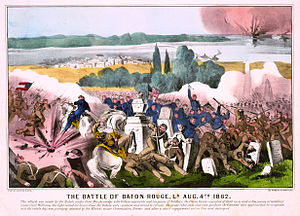Battle of Baton Rouge (1862)
| Battle of Baton Rouge | |||||||
|---|---|---|---|---|---|---|---|
| Part of the American Civil War | |||||||
 c.1862 Currier & Ives lithograph of the battle |
|||||||
|
|||||||
| Belligerents | |||||||
|
|
|
||||||
| Commanders and leaders | |||||||
|
Thomas Williams† Thomas W. Cahill |
John C. Breckinridge Charles W. Read |
||||||
| Strength | |||||||
| 2,500 | 2,600 | ||||||
| Casualties and losses | |||||||
| 371 killed, wounded and missing | 478 killed, wounded and missing | ||||||
Coordinates: 30°27′04″N 91°10′03″W / 30.4510°N 91.1676°W
The Battle of Baton Rouge was a ground and naval battle in the American Civil War fought in East Baton Rouge Parish, Louisiana, on August 5, 1862. The Union victory halted Confederate attempts to recapture the capital city of Louisiana.
On April 25, 1862, the day before New Orleans fell to the U.S. Navy fleet under Admiral David Farragut, the Confederate state government decided to abandon Baton Rouge, moving first to Opelousas, and then to Shreveport. All cotton in the area was set afire to prevent it falling into Union hands. On May 9, Navy Commander James S. Palmer of the federal gunboat USS Iroquois landed at the town wharf and took possession, without resistance, of the Pentagon Barracks and the arsenal. Two weeks later, a party of guerrillas attacked a rowboat carrying a naval officer. In retaliation, Farragut's flagship, the Hartford, bombarded the town, causing civilian casualties and damaging St. Joseph's Church and other buildings. On May 29, U.S. Brigadier General Thomas Williams arrived with six regiments of infantry, two artillery batteries, and a troop of cavalry, and began the occupation of Baton Rouge.
...
Wikipedia
